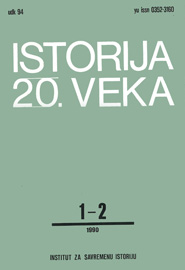NEKI POGLEDI U SRBIJI NA POLITIČKU DELATNOST DR ANTONA KOROŠCA 1918 - 1940.
SERBIAN VIEWS ON THE POLITICAL ACTIVITY OF DR. ANTON KOROŠEC
Author(s): Momčilo ZečevićSubject(s): Political history, Recent History (1900 till today), Pre-WW I & WW I (1900 -1919), Interwar Period (1920 - 1939), WW II and following years (1940 - 1949), Inter-Ethnic Relations, Politics and Identity
Published by: Institut za savremenu istoriju, Beograd
Keywords: Kingdom of Yugoslavia; Yugoslav politics; Anton Korošec; "Slovenska ljudska stranka"; political activity; Serbian views; 20th century; Slovenians and Serbs relations;
Summary/Abstract: The activity of Dr. Anton Korošec, the leader of the Slovenska ljudska stranka, is viewed in the context of Yugoslav politics in the period between 1917 and 1940. The analysis lays emphasis on views and evaluations of Korošec’s political activity given by people and institutions in Serbia, with a special focus on the relations Slovenians and Serbs in the time of the Kingdom of the Serbs, Croatians and Slovenians, that is the Kingdom of Yugoslavia, until Korošec's death on December 14th, 1940. A choice was made of the most essential and indicative events and evaluations, on the basis of which a general judgment could be made of the political profile and activity of A. Korošec in the Yugoslav state. Anton Korošec proves to have been an eminent figure both in politics regarding Yugoslavia’s unification, towards the end of World War I and later, in the political life of the unified state. He held prominent public positions from the beginning, several times as minister in various departments and, in 1928, he became the first „prečanski” prime minister of Yugoslavia. Korošec’s power and influence in state politics was based on the support he hoped to gain from the Serbian Radikalna stranka and the court circles, headed by Aleksandar Karađorđević. To attain this end, he adroitly used the position of his party in disputes between Serbia and Croatia, abiding mainly by the politics of Serbia. In this way Korošec successfully effectuated Slovenian national interests, struggling primarily for Slovenia's major autonomy. At the same time, he firmly supported the integrity of the Yugoslav state and was a renowned advocate of Yugoslav politics in high state politics of the Kingdom between 1918 and 1940. The frequent oscillations in Korošec’s politics are the manifestations of the necessity to maintain the domination of the catholic party and movement in Slovenia and of clever tactical moves made by him in Yugoslav „high" politics, which had definite positive results for the general advancement of Slovenians in Yugoslavia in the years between 1918 and 1941.
Journal: Istorija 20. veka
- Issue Year: 1990
- Issue No: 1+2
- Page Range: 117-138
- Page Count: 22
- Language: Serbian

